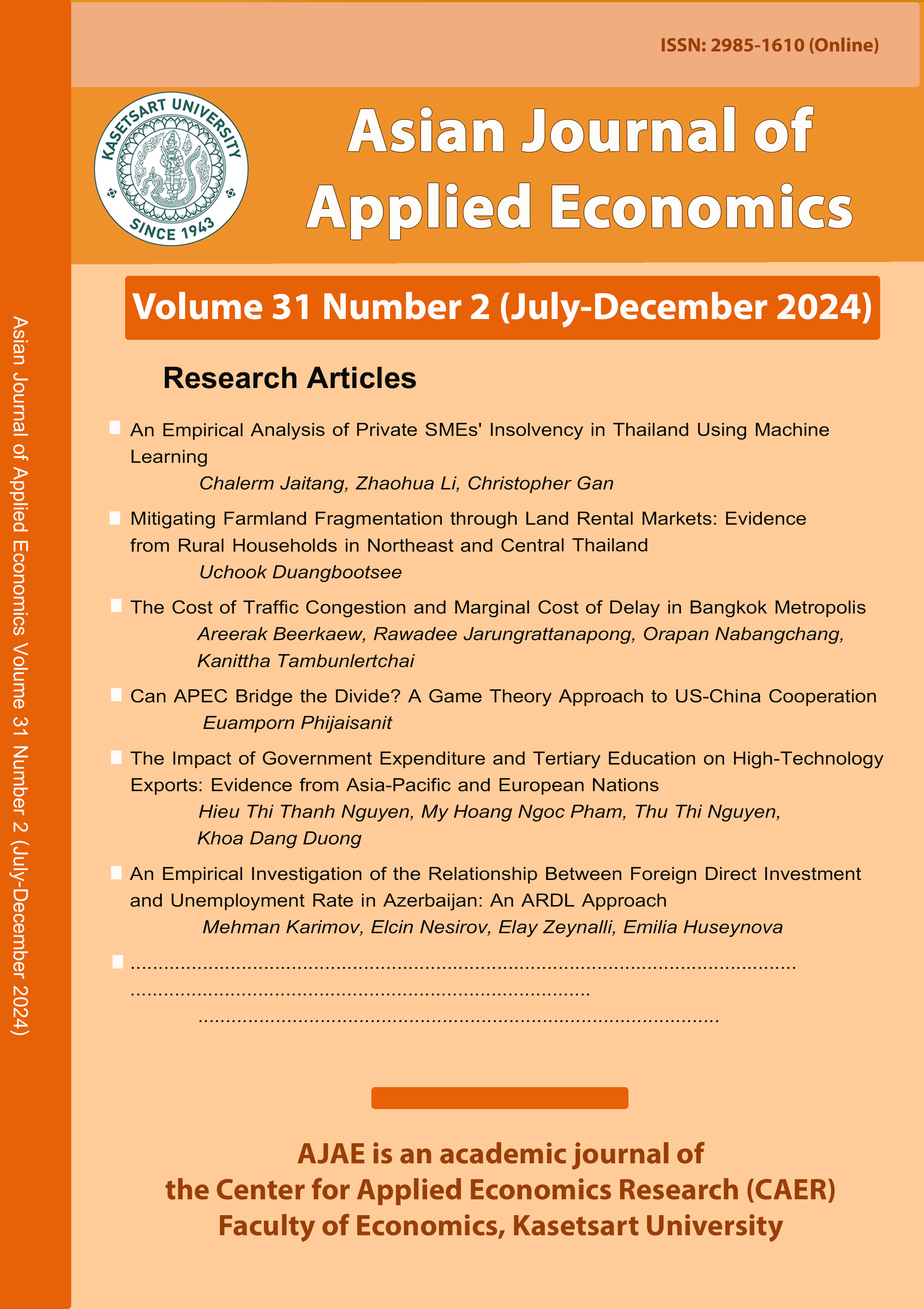The Cost of Traffic Congestion and Marginal Cost of Delay in Bangkok Metropolis
Main Article Content
Abstract
Traffic congestion in Bangkok, particularly during rush hours, imposes significant private and external economic costs on society, a problem exacerbated by the rapid increase in the number of private vehicles in the city. To the best of our knowledge, no study has estimated the cost of traffic congestion in Thailand using a survey research design. This study aims to estimate both the cost and the marginal cost of heavy traffic during rush hours, utilizing data gathered from 215 commuters in Bangkok and nearby suburbs. The findings indicate that the annual traffic congestion costs per vehicle range between THB 77,021 and THB 76,155 (USD 2,567 and USD 2,538) at 2023 price levels, depending on the greenhouse gas (GHG) damage cost discount rates used. Additionally, the marginal cost of delay per vehicle due to heavy traffic is approximately THB 646 (USD 22) at 2023 price levels. This value can serve as a proxy for the benefit (or avoided cost) that commuters could gain if the government were to implement traffic congestion mitigation measures, such as congestion charges. While imposing fees could be one potential solution to address the traffic problem in Bangkok, further research is needed to determine the appropriate amount of charges, considering factors like the price elasticity of demand for congestion charges and their acceptability to the public.
Article Details

This work is licensed under a Creative Commons Attribution-NonCommercial-NoDerivatives 4.0 International License.
The paper is published under CC BY-NC-ND, in which the article is freely downloaded and shared in its original form non-commercially and its citation details are identified.
References
Bangkok Metropolitan Administration (BMA). (2013). Bangkok traffic report 2013 (Traffic report). Bangkok, Thailand: BMA, Traffic and Transportation Department. (in Thai)
Bilbao-Ubillos, J. (2008). The costs of urban congestion: Estimation of welfare losses arising from congestion on cross-town link roads. Transportation Research Part A: Policy and Practice, 42(8), 1098–1108.
Centre for Economics and Business Research (CEBR). (2014). The future economic and environmental costs of gridlock in 2030: An assessment of the direct and indirect economic and environmental costs of idling in road traffic congestion to households in the UK, France, Germany and the USA (Research report). London, UK: CEBR.
Department of Land Transport (DLT). (2023). Statistics of vehicle registration. Ministry of Transport. Retrieved from https://web.dlt.go.th/statistics/
Field, B. C., & Olewiler, N. D. (2015). Environmental economics (4th Canadian Ed.). Toronto, Canada: McGraw-Hill Ryerson.
Gujarati, D. N. (2003). Basic Econometrics (4th Ed.). New York, NY: McGraw-Hill.
He, Q. (2013 ). Research on time cost of urban congestion in Beijing. In F. Chen, Y. Liu, & G. Hua (Eds.), LTLGB 2012: Proceedings of the International Conference on Low-carbon Transportation and Logistics, and Green Buildings (pp. 225-236). Berlin, Heidelberg: Springer.
Honda company. (2017). The cost of periodic maintenance. Retrieved from https://www.honda.co.th/service/periodical/detail
Jaensirisak, S., Sumalee, A., & Ongkittikul, S. (2009). A road map for road pricing implementation in Thailand. Atrans Research, 1(1), 27-38.
Kolstad, C.D. (2011). Environmental economics (2nd Ed.). Oxford, UK: Oxford University Press.
Office of Transport and Transport Policy and Planning (OTP). (2015). The application of the road pricing model (Draft executive summary report). Bangkok, Thailand: OTP. (in Thai)
Office of Transport and Transport Policy and Planning (OTP). (2020). Summary of survey of average vehicle speed during morning rush hour in Bangkok. Retrieved from https://otp.gdcatalog.go.th/group/stat-transport
Piriyawat, S., Van, H. T., & Fujii, S. (2009). The roles of perceived effectiveness and problem awareness in the acceptability of road pricing in Bangkok. Songklanakarin Journal of Science and Technology, 31(2), 181-188.
Thailand Greenhouse Gas Management Organization (TGO). (2011). Carbon-footprint estimation method under the carbon-footprint estimation project (Research report). Bangkok, Thailand: TGO. (in Thai)
Transport Canada. (2007). The cost of urban congestion in Canada (Research report). Ontario, Canada: Transport Canada, Environmental Affairs.
U.S. Environmental Protection Agency (EPA). (2015). Technical update of the social cost of carbon for regulatory impact analysis under Executive Order 12866 (Technical report). Washington, D.C: Interagency Working Group on Social Cost of Carbon, United States Government.
U.S. Environmental Protection Agency (EPA). (2017). The official U.S. government source for fuel economy information. Retrieved from https://www.fueleconomy.gov
Wallis, I. P., & Lupton, D. R. (2013). The costs of congestion reappraised (Research report No. 489). Wellington, New Zealand: NZ Transport Agency.


